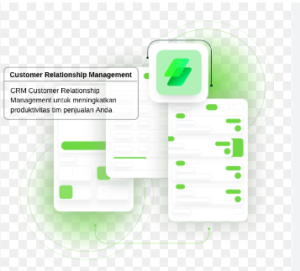Introduction
In the digital age, where businesses are increasingly focused on enhancing customer relationships and streamlining operations, a Customer Relationship Management (CRM) website has become an indispensable tool. A CRM website serves as a centralized hub for managing customer interactions, sales processes, marketing campaigns, and more. In this article, we will explore the concept of a CRM website, its key components, benefits, and provide insights into building an effective CRM website tailored to your business needs. 
The Role of a CRM Website
A CRM website plays a pivotal role in modern business operations by providing a unified platform for managing customer data, tracking interactions, and automating various processes. Whether you’re a small business or a large enterprise, a well-designed CRM website can help you enhance customer relationships, improve sales efficiency, and drive growth.
Key Components of a CRM Website
To create a powerful CRM website, it’s essential to understand its key components and functionalities:
1. Contact Management
Contact management is at the core of a CRM website. It allows businesses to store, organize, and update customer information, including names, contact details, communication history, and preferences.
2. Lead and Opportunity Tracking
Effective lead and opportunity tracking enable sales teams to manage leads through the sales pipeline, from initial contact to conversion. This feature helps prioritize and nurture potential customers.
3. Sales Automation
Sales automation streamlines repetitive tasks, such as sending follow-up emails, assigning leads to sales representatives, and generating quotes or invoices. Automation increases sales efficiency and minimizes errors.
4. Marketing Automation
Marketing automation features enable businesses to create and manage marketing campaigns, track customer engagement, and automate email marketing, lead nurturing, and segmentation.
5. Reporting and Analytics
Robust reporting and analytics tools provide valuable insights into sales performance, customer behavior, and the effectiveness of marketing efforts. These insights inform strategic decision-making.
6. Workflow Automation
Workflow automation allows businesses to design and automate custom workflows that align with their unique processes. Automation ensures that tasks are executed consistently and efficiently.
7. Integration Capabilities
A CRM website should seamlessly integrate with other essential business tools and software, such as email, calendars, e-commerce platforms, and social media. Integration ensures data consistency and facilitates collaboration.
8. Customer Support and Helpdesk
Some CRM websites include customer support and helpdesk features, which enable businesses to manage customer inquiries, support tickets, and provide timely responses to issues. This enhances customer satisfaction and loyalty.
Benefits of a CRM Website
Implementing a CRM website can bring a wide range of benefits to your business:
1. Enhanced Customer Relationships
A CRM website centralizes customer information and interactions, allowing businesses to provide personalized and timely responses. This leads to stronger customer relationships and improved satisfaction.
2. Improved Sales Efficiency
Sales automation features reduce manual tasks, enabling sales teams to focus on high-value activities like lead nurturing and closing deals. This results in shorter sales cycles and increased revenue.
3. Streamlined Marketing
Marketing automation tools help businesses create, execute, and track marketing campaigns efficiently. This leads to more targeted marketing efforts and higher conversion rates.
4. Data-Driven Decisions
Robust reporting and analytics provide actionable insights that inform strategic decisions. Data-driven approaches help optimize sales and marketing strategies.
5. Consistency and Accuracy
Workflow automation ensures that tasks are executed consistently, reducing errors and enhancing operational efficiency.
6. Scalability
A CRM website can grow with your business. As your customer database expands and your needs evolve, a well-designed CRM website can scale to accommodate those changes.
Building an Effective CRM Website
Creating an effective CRM website involves several crucial steps:
1. Assess Your Needs
Begin by assessing your business’s specific CRM requirements. Identify the features and functionalities that are most important for your organization.
2. Select the Right CRM Software
Choose a CRM software solution that aligns with your needs and budget. Consider factors such as scalability, customization options, and integration capabilities.
3. Data Migration
If you’re transitioning from an existing CRM system or managing customer data in spreadsheets, plan for data migration. Ensure that your data is transferred seamlessly to the new CRM website.
4. Customization
Leverage customization options to tailor the CRM website to your business processes. Create custom fields, workflows, and reports to match your unique requirements.
5. Training and Onboarding
Ensure that your team receives adequate training and onboarding to use the CRM website effectively. Training empowers users to maximize the benefits of the system.
6. Integration
Integrate the CRM website with other tools and software your business uses, such as email, calendar, and marketing platforms. Integration enhances efficiency and ensures that all departments have access to up-to-date customer information.
7. Testing and Optimization
Regularly test and optimize the CRM website to ensure that it performs optimally and meets evolving business needs. Solicit feedback from users to identify areas for improvement.
Conclusion
A CRM website is a fundamental asset for businesses seeking to thrive in today’s customer-centric marketplace. By centralizing customer data, automating processes, and providing valuable insights, a well-designed CRM website can enhance customer relationships, streamline operations, and drive growth. Whether you’re a small startup looking to establish a solid foundation or a large enterprise aiming to optimize your sales and marketing efforts, the implementation of an effective CRM website is a strategic investment that can yield significant returns. By carefully assessing your needs, selecting the right CRM software, and following best practices for customization and integration, you can build a CRM website that empowers your business to excel in managing customer relationships and achieving your growth objectives